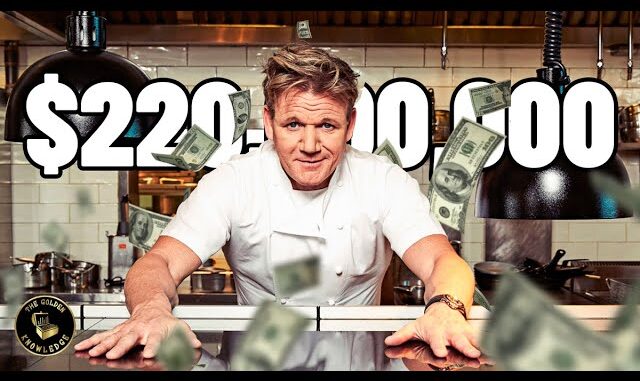
To millions of viewers around the world, Gordon Ramsay is the hot-tempered chef who doesn’t hesitate to shout “It’s RAW!” at trembling cooks. His explosive rants have become late-night talk show punchlines, his insults turned into internet memes. But while most see the fury and the fire, very few recognize the business brilliance behind the brand.
Beneath the scowl lies a mind as sharp as his kitchen knives. Gordon Ramsay is not just a chef — he’s a global entrepreneur, media mogul, and brand architect. With over $220 million to his name, he has built one of the most successful empires in the culinary world. And he did it not just by cooking — but by thinking strategically, scaling smartly, and never compromising on quality.
So how did a working-class kid from the UK transform himself into a worldwide brand? The answer lies in grit, vision, and a very deliberate business plan.
It all began, of course, with food. Ramsay trained under some of the most renowned chefs in Europe — Marco Pierre White, Guy Savoy, and Joël Robuchon — mastering classical French cuisine with military precision. In 1998, he opened his first restaurant, Restaurant Gordon Ramsay, in London. Within three years, it was awarded three Michelin stars, and Ramsay became a force to be reckoned with.
But unlike many chefs who remain confined to the kitchen, Ramsay had a bigger vision. He understood early on that food was just one part of a larger ecosystem — one that included television, publishing, licensing, and eventually, digital media.
In the early 2000s, Ramsay entered the world of television with Boiling Point, a documentary-style look at his kitchen life. Audiences were captivated by his intensity and his unfiltered honesty. It was raw, dramatic, and wildly entertaining — and TV executives took notice.
From there, Hell’s Kitchen was born. Then Kitchen Nightmares, MasterChef, Hotel Hell, The F Word, and Next Level Chef. Each show had its own format, but all featured one consistent ingredient: Gordon Ramsay. His no-nonsense persona, combined with his undeniable culinary expertise, made him a star — and a brand.

These shows didn’t just elevate his profile; they became powerful marketing tools for everything else he touched. Every angry outburst, every red-faced critique, and every emotional redemption arc created a deeper connection with audiences — and expanded his reach far beyond foodies.
Today, Ramsay’s production company, Studio Ramsay, develops content across multiple platforms, from traditional television to YouTube and social media. He has over 100 million combined followers across his digital channels, making him one of the most followed chefs in the world.
But Ramsay didn’t stop at the screen. He turned his name into a symbol of excellence in hospitality.
His restaurant empire now spans across the globe — from London, Paris, and Dubai to Las Vegas, Miami, and Singapore. His brands include Gordon Ramsay Steak, Gordon Ramsay Burger, Gordon Ramsay Fish & Chips, and even fast-casual concepts like Street Pizza.
What’s remarkable is that Ramsay doesn’t just license his name and walk away. He remains deeply involved in quality control, insisting on training, consistency, and experience. Each restaurant reflects his standards — and his refusal to compromise.
That commitment is what allows his restaurants to maintain both popularity and critical acclaim. It’s also what sets him apart from celebrity chefs who fade with time. Ramsay’s empire has depth, not just breadth.
His publishing ventures are another powerhouse. Ramsay has released more than 25 cookbooks, many of them bestsellers. From beginner-friendly guides to high-end culinary collections, his books continue to dominate charts in both the U.K. and U.S.
On the retail side, Ramsay has partnered with brands on cookware, kitchen appliances, and food products. He’s launched his own line of knives, utensils, pans, and even online cooking courses. In 2020, he began offering exclusive content through MasterClass, teaching aspiring chefs his techniques and philosophy.
One of his smartest moves was to diversify his brand without diluting it. While he expanded across categories, he kept his identity consistent: a relentless pursuit of excellence, tough love, and high standards. Whether you’re watching Hell’s Kitchen or trying a burger at Heathrow Airport, you know exactly what Gordon Ramsay stands for.
And through it all, he’s continued to evolve. In recent years, Ramsay has shown a softer side on screen, mentoring young chefs, highlighting family life, and supporting culinary diversity. He’s embraced social media, connecting directly with fans, and leaning into humor — often making fun of his own viral reputation.
Still, his standards haven’t wavered. In a world of celebrity burnout and short-lived fame, Gordon Ramsay has played the long game. His empire is not built on gimmicks or trends, but on substance, vision, and hard-earned credibility.
